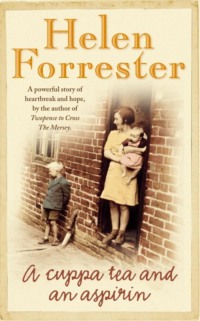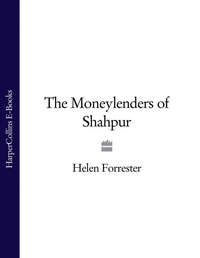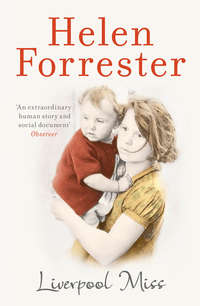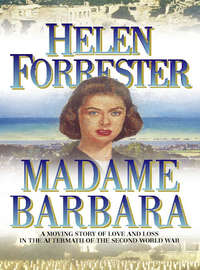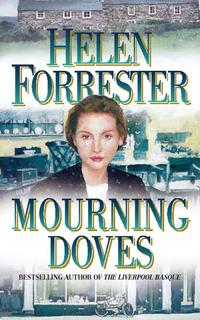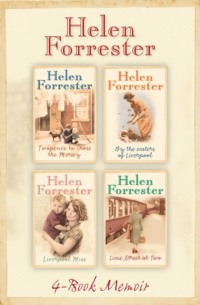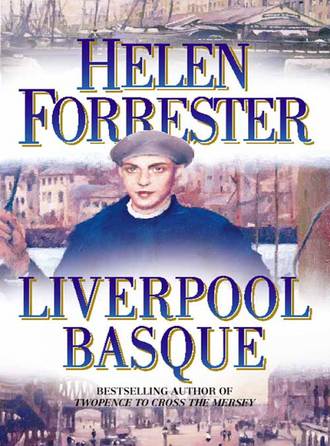
Полная версия
The Liverpool Basque

HELEN FORRESTER
The Liverpool Basque

Copyright
This novel is entirely a work of fiction. The names, characters and incidents portrayed in it are the work of the author’s imagination. Any resemblance to actual persons, living or dead, events or localities is entirely coincidental.
Harper
HarperCollinsPublishers Ltd. 1 London Bridge Street London SE1 9GF
www.harpercollins.co.uk
First published in Great Britain by HarperCollinsPublishers 1993
Copyright © Helen Forrester 1993
The Author asserts the moral right tobe identified as the author of this work
All rights reserved under International and Pan-American Copyright Conventions. By payment of the required fees, you have been granted the nonexclusive, nontransferable right to access and read the text of this ebook on screen. No part of this text may be reproduced, transmitted, downloaded, decompiled, reverse engineered, or stored in or introduced into any information storage and retrieval system, in any form or by any means, whether electronic or mechanical, now known or hereinafter invented, without the express written permission of HarperCollins ebooks
This book is sold subject to the condition that it shall not, by way of trade or otherwise, be lent, re-sold, hired out or otherwise circulated without the publisher’s prior consent in any form of binding or cover other than that in which it is published and without a similar condition including this condition being imposed on the subsequent purchaser
HarperCollinsPublishers has made every reasonable effort to ensure that any picture content and written content in this ebook has been included or removed in accordance with the contractual and technological constraints in operation at the time of publication
Source ISBN: 9780006473343
Ebook Edition © DECEMBER 2012 ISBN 9780007392162
Version: 2016-08-26
Dedication
This novel is dedicated to my friend,Doroteo Vicente Elordieta, a Basque from Liverpool,whose wonderful stories about the cityinspired me to write it
Epigraph
Just as the twig is bent the tree’s inclined
Epistle i, line 149
Moral Essays
Alexander Pope, 1688–1744
Contents
Cover
Title Page
Copyright
Dedication
Epigraph
Chapter One
Chapter Two
Chapter Three
Chapter Four
Chapter Five
Chapter Six
Chapter Seven
Chapter Eight
Chapter Nine
Chapter Ten
Chapter Eleven
Chapter Twelve
Chapter Thirteen
Chapter Fourteen
Chapter Fifteen
Chapter Sixteen
Chapter Seventeen
Chapter Eighteen
Chapter Nineteen
Chapter Twenty
Chapter Twenty-one
Chapter Twenty-two
Chapter Twenty-three
Chapter Twenty-four
Chapter Twenty-five
Chapter Twenty-six
Chapter Twenty-seven
Chapter Twenty-eight
Chapter Twenty-nine
Chapter Thirty
Chapter Thirty-one
Chapter Thirty-two
Chapter Thirty-three
Chapter Thirty-four
Chapter Thirty-five
Chapter Thirty-six
Chapter Thirty-seven
Chapter Thirty-eight
Chapter Thirty-nine
Chapter Forty
Chapter Forty-one
Chapter Forty-two
Chapter Forty-three
Chapter Forty-four
Chapter Forty-five
Chapter Forty-six
Chapter Forty-seven
Chapter Forty-eight
Chapter Forty-nine
Chapter Fifty
Keep Reading
Selective Bibliography
About the Author
Author’s Note
Other Works
About the Publisher
Chapter One
Ignoring the pouring rain, he came out of the house, and then turned to check that the front door had closed properly behind him. Satisfied, he walked slowly down the path between the flowerbeds, empty except for a few winter aconites cautiously beginning to open.
When he reached the two steps which led down to the pavement, he paused before carefully descending them. As the wind off the Strait caught him, his shiny black oilskin flapped against his lean frame. A fringe of white hair fluttered round the edge of the black beret set firmly on his head; the beret had been arranged so that it had a small peak to protect his forehead and encourage the rain to fall down his cheeks instead of veiling his sight.
Safely on the narrow pavement, he lingered for a moment to look across the Juan de Fuca Strait. The Olympic Mountains were obliterated by the downpour, but nearer to hand a freighter was stubbornly butting its way through the sheeting rain towards Victoria Harbour. With a seaman’s eye for weather, he looked up at the louring clouds, pursed his lips and muttered, ‘Cold enough for snow.’
Water was trickling down his neck, so he heaved his collar up higher and then proceeded along The Esplanade towards the cemetery. He walked with his head bent, his shoulders slightly hunched, as if expecting to hit his skull on a door frame if he straightened up. Though his gait was light and steady, his old Wellington boots made an intermittent squishing sound as he slopped through muddy puddles.
In the large inside pocket of his oilskin was a single pink rose wrapped in damp tissue paper. He had bought it yesterday from the florist in Cook Street; throughout the winter he had a standing order with her, to purchase the flowers four at a time. He kept them fresh in a cut-glass vase on the dining-room table, and, regardless of the weather, he took one each day to the cemetery to lay on the grave of his wife, Kathleen.
Sometimes the florist was not able to obtain the pink or white blooms which he requested, and he would have to make do with red ones, which Kathleen had not loved quite so much. In summer, he cut roses in shades of pink or cream from the bushes which she herself had planted in their garden when first they had retired to Vancouver Island. While she had the strength, she had tenderly pruned and fertilized them herself. Then, when she had begun to fail, he had pushed her wheelchair on to the lawn, and had learned to look after them for her, doing his best to hide from her the agony of mind he had felt, as he watched her suffer the multiple infections to which leukaemia laid her open.
Seamen don’t get much chance to garden, he ruminated, as he gazed down at yesterday’s offering, which lay, tattered and sodden, on the grave in front of the memorial stone. But Kathleen had loved her garden, and every day he made this small pilgrimage to tell her that he was caring for it and for her household icons, and that he loved her still. Mostly, however, he came to ask her forgiveness for having failed, when she was so ill, to keep her out of pain. Mixed with the rain, tears ran down his face; no matter how the years since her death rolled along, they failed to obliterate from his mind the torture he had watched her endure. There were, of course, days when he took the walk to the cemetery from force of habit; but all too often he went in the hope of easing his own haunting memories. Today, his nightmare was very close.
He bent down carefully to avoid the dizziness which, nowadays, sometimes bothered him, and picked up yesterday’s battered bloom. Regardless of its wet condition, he stuffed it into his outside pocket. His chest felt tight, and he paused to take a few short breaths of the cold, damp air, before slowly opening his oilskin to retrieve the slightly flattened fresh rose from his inner pocket. He unrolled the tissue paper from it and laid the flower in front of the headstone. The wind was strong and capricious, so he picked up a small rock and laid it on the stalk to hold it down. Most people had a vase into which they put their flower offerings, but he laid them on the ground; in his mind’s eye he always saw the roses as lying between his wife’s perfect white breasts.
Then he addressed the marble headstone. He did not see the words cut into it, In loving memory of Kathleen Echaniz, beloved wife of Manuel Echaniz, born 3rd June, 1914, died 20th January, 1984. At peace. His first words were, as always, ‘Forgive me, my darling, forgive me.’ He paused, as if waiting for a reply. Then he swallowed hard, and lifted his head a little, to look out towards the heaving waters of the Strait. He saw his wife’s smiling face, her eyes unclouded by illness; he felt her fullness beneath him, before suffering reduced her to a skeleton; and, as he had always done, either by letter from distant ports or when they lay comfortably in bed together, he told her all that had happened to him in the previous twenty-four hours, all the funny things, all the small disasters. Today, he said that he had washed her Royal Doulton figurines in the cabinet in the sitting-room and had set them back exactly as she had left them, that last night he had cooked himself some fish for supper, and that Veronica Harris, her friend from next door, had brought him in some homemade cookies, as she did each week.
The soft words came out like a litany, not in Kathleen’s native English, but in a strange evocative language known only to a few, a language which Kathleen had never been able to master.
He spoke in Basque, a unique language of farmers and shepherds in the enclaves of the Pyrenees, of fishermen in the Bay of Biscay, of iron workers and factory hands in big cities like Bilbao and smaller ones like Guernica and Pamplona; it was also spoken by lonely, elderly shepherds and their descendants in Nevada, Utah and Arizona, and by small groups of emigrants in Eastern Canada. It was a language so old that it was unrelated to any other language in the modern world, preserved by people shielded by nature’s walls, the Pyrenees, between France and Spain. It had the advantage that anyone in the cemetery who heard his words to his wife would not understand them.
Manuel Echaniz was a Basque. Though he also spoke Spanish quite fluently, he seethed with anger when he was frequently mistaken for a Spaniard. He would occasionally flare up and say that though General Franco had, in the Spanish Civil War, bombed into submission his grandparents’ native city of Bilbao, he had never succeeded in making its Basque inhabitants into Spaniards, any more than Roman and Moorish invaders of Spain had been able to do so in much earlier times.
He himself had been born in England, in the port of Liverpool, and he spoke English with a pronounced Liverpool accent. Nevertheless, he would affirm indignantly that, like his father and grandfather before him, he was a Basque and very proud of it. For the benefit of Canadians, he would add, also, that he was proud to be a Canadian citizen – but he was still pure Basque!
He had married Kathleen Weston, a Vancouver Island girl, whom he had met, during the war, in Halifax, Nova Scotia. She had tried several times to learn his native tongue, but had finally given up, arguing that his command of English was so good that they could communicate perfectly in that language. Because he had spoken to her consistently since babyhood only in Basque, his daughter Faith understood the language – but she would always answer him in English. As for Lorilyn, his only grandchild, now aged nineteen and doing her first year at the University of British Columbia, she would laugh and tell him to stop ‘talking funny’ and speak English.
Sometimes, without his Canadian Kathleen to support him, he wondered why he stayed in Victoria. He frequently longed for the familiar dockside streets of Liverpool, for the warmth and friendliness of the Baltic Fleet or the Flags of all Nations, both pubs that he remembered as being packed with an international gathering of seamen, all talking exuberantly at once. And he wanted to hear again St Peter’s church bell calling him to Mass, a Mass celebrated in Latin. He could go to Mass in Victoria; he could even ease his soul by going to Confession; but it would all be in English, as lately ordained by the Vatican, and would have little of the comforting magic of a Mass chanted in Latin, as it had been when he was young. The Latin Mass, untouched by war or pestilence, unchanging like God himself, had been a dear familiar ceremony, no matter how strange a port his ship had been tied up in. If he had to listen to Mass in the vernacular, he wanted to hear it in Basque – and for that he would have to return to Vizcaya, the province of his forefathers.
He sighed as he turned from Kathleen’s grave and began slowly to make his way homeward under the dripping pine trees. Both Liverpool and Vizcaya were a long way off; journeys to either of them were not to be undertaken lightly by an eighty-four-year-old. Then there was Faith who lived with her Canadian husband, George McLaren, in Vancouver; she was his living link with Kathleen. She did come occasionally, with her family, to visit him, but never frequently enough. He would smile when he thought of her and try to shake off his depression. Yet, sometimes when he could not sleep, a fearful inner loneliness would overwhelm him to the point of terror, and older voices called him, voices of others whom he had loved, Basque voices, Liverpool voices, people who were part of his very nature, people he had not been able to tell Kathleen much about.
He knew that he dreaded dying in this pretty city on the west coast of Canada, even if they laid him beside Kathleen. It was too lonely – a single Basque name in a cemetery full of British pioneers. Kathleen was amid her own, but he would not be.
He wanted, at least, to lie in a Liverpool churchyard or cemetery, surrounded by headstones with Basque names on them, to be laid to rest by Basques speaking either the thick colloquial English of his childhood friends or the language of his roots, Basque.
As he pushed to one side a rain-dropped branch of Scottish pine, he considered soberly how strange it was that, when he thought about his own death, all that had happened to him in Canada was wiped out of his mind, even the long, contented years with Kathleen. What was left – the essence of himself – was Liverpool Basque; and he wanted to lie with his parents and grandparents and friends in a corner of Liverpool they had made their own. Afterwards, he wanted toasts to his memory drunk in wines familiar to him and funny stories told about him in pithy Basque phrases.
Back on the pavement that led to his home, he shivered. It was not easy to have a conscience formed by Jesuits in the back streets of Liverpool. They taught perfection – but an ordinary man could do only his best – and he had done his best for Kathleen.
Chapter Two
Although the morning’s winter storm had been so intense and Victoria’s Scenic Drive had been, for once, deserted, Manuel’s expedition had not gone unnoticed.
Seated in the bay window of the bungalow next door, Sharon Herman, daughter of an old friend of Veronica Harris, had noted with mild interest the very old man going for a walk despite the inclement weather.
She was a nurse who specialized in the care of the terminally ill, and she had just arrived to take up a position in a local hospital about to open a palliative care ward. Her interest in the elderly pedestrian was kindly and caring – she felt he should not be getting soaking wet at his age.
She turned towards Veronica, who was seated at her computer across the room, trying to unravel the complexities of Townsman’s Tailors’ accounts outstanding. An elderly widow, who lived alone, she earned her living by keeping the accounts of small businesses in the neighbourhood. Today, she was finding it difficult to work with someone else in the room, though she did not grudge, in the least, offering her friend’s daughter temporary accommodation until she found herself a flat conveniently close to the hospital.
‘Veronica, who’s the old man next door? He’s just gone out – in this weather! He’ll get soaked – hasn’t he got a car?’
Veronica turned impatiently towards Sharon. Then she glimpsed through the bay window the bent figure plodding up the road. Her expression changed, and she smiled. ‘Oh, that’s Manuel Echaniz – Old Spanish, Kathleen’s husband. She was the friend I told you about – died of cancer.’
‘Is he Spanish?’
‘No. Kathleen told me he was born in the UK. She said he’s a Basque, whatever that might be. He speaks English and Spanish – and his own language, which only Faith seems to understand – that’s his daughter, you know.’ She paused to rub her eyes, tired from concentration on the computer screen. Then she said, ‘He’ll be going up to the cemetery.’
‘Does he work there?’
‘No. He goes up every day to put a flower on Kathleen’s grave. I’ve never known him miss a day since she passed away – must be eight years now.’
Sharon laughed. ‘You’re kidding?’
‘No, I’m not. You should’ve seen them together. They were great!’
Sharon moved uneasily in her chair by the window, and her book slid off her lap. She bent to pick it up. ‘He could take some flowers up every week – it would save him time. Or he could drive up on a day like this.’
‘Well, he does have a car – he doesn’t use it much, though.’ She smiled indulgently. ‘Weather never bothered him – I guess because he went to sea for years. And as for going every day, he told me once he wanted her to know that he thought of her each day.’ Her smile faded, and she sighed a little despondently; she had often wished that Manuel would think of her every day. He still seemed to her an attractive man, with his wide smile and twinkling black eyes. His finely lined face was still healthily tanned, and the long, narrow shape of it, with its flat cheekbones, still had the firmness of a much younger man.
‘Sounds like an old movie,’ Sharon was saying, as she put her book on a side table. ‘Do you think he’s got a screw loose?’
‘Not him! He’s in his eighties now, but there’s nothing wrong with his brains – and I’ve never known him be sick.’ She hesitated, and then added, ‘He’s a great old guy.’
Sharon made a wry mouth. ‘Veronica, you’re too sentimental,’ she teased. ‘Men aren’t like that. Do you think he feels guilty about her in some way?’
The question irritated Veronica. Sharon, still smarting from a recent divorce, might be bitter about men – but she was, Veronica felt, being very unfair to Manuel.
‘You’ve read too much pop psychology,’ she responded huffily, and swung her chair round to face the computer screen again. ‘I would have thought that you, with your special training, would know how long a person can grieve.’
The rebuke, from a woman who was usually very mild-mannered, jolted Sharon. She realized that the question had arisen from the resentment she still felt as a divorcee. Veronica was right; each individual needed his own time in which to recover from bereavement.
Ashamed, she inquired in a conciliatory tone if Veronica would like her to make a cup of coffee. Privately, she thought how glad she would be to begin her new job on the following Monday; it would take her mind off her own troubles.
Thankful to get her guest out of the room for the moment, Veronica said politely that she would like a cup very much, and the coffee was on the bottom shelf of the cupboard next to the sink. She wished heartily that the rain would ease, so that Sharon could resume her hunt for an apartment.
In the cluttered kitchen, Sharon put a clean filter in the coffee maker, followed by spoonfuls of coffee. She swore softly as the old kitchen tap spattered water over her when she turned it on. After filling the pot, she stared with some despair through the kitchen window at the sweeping rain. The weather was as cold and dismal as she felt herself; her only consolation was that Winnipeg, from which she had come a couple of days before, would be suffering infinitely worse temperatures. In her pocket lay a well-thumbed last letter from her lawyer, enclosing his final bill for negotiating a parsimonious settlement with her husband. The letter wrote Finis to a whole segment of her life.
Divorce had been much more painful than she had expected. After seven difficult years of a childless marriage, she had anticipated a sense of joyous freedom; instead, she felt a numbing sense of loss. Was this how one felt after a bereavement? Was this how Old Spanish felt? God help her, if she still felt like this at the end of eight years. One thing was certain, her husband would never waste time putting flowers on her grave.
She had worked all her married life. Now, she was going to start anew, away from the people who had known her when she was married. It was the kind of work which would demand a great deal from her, as she dealt with the dying and with their grief-stricken families; yet, she knew from experience that the close relationship between patient and nurse was not a one-way situation; at no time did one come so close to a person as when that person was on his or her deathbed. Beside that experience, she considered as the coffee percolated, what was a divorce? Particularly when there were no children involved.
She carefully poured the coffee into two mugs, and told herself sharply to cheer up. After the coffee, she would go out to look at the apartments she had marked in the newspaper rentals column. Blow the rain. She took Veronica’s mug to her, and drank her own coffee despondently in the kitchen. Then, she quickly put on a raincoat, and took Veronica’s umbrella off a hook in the hall cupboard. Opening the door into the living-room a crack, she called to Veronica that she was going to look at an apartment and that she was not to bother about lunch for her. Then, map in pocket, she went firmly out into the rain.
The rain was lessening and the umbrella hardly necessary. She remembered suddenly her parents still living together in their Florida condominium and managing to keep extraordinarily well for their age, under the Florida sun. Married for thirty-five years, she considered with some wonderment, as she crossed the road at a traffic light. How did they do it? Old Spanish must have been married at least as long. Some people had all the luck.
But was it luck? Or was it some secret formula that the older generation used to build a happy marriage? Cynics said they stuck together because women had no means of earning a living, but it could not be that alone, because even slaves in the States who had no hope at all used to run away.
She looked up to check the street number of an apartment block and then absently pressed a bell marked Building Manager. No matter what the secret is, this is where you begin all over again, she told herself as she waited for a response.
Chapter Three
Unaware of the interest he had sparked in Sharon Herman, Old Manuel stood in his narrow back hall and shook the rain off his beret and oilskin before hanging them to drip in a small washroom by the kitchen door. Without them, dressed in a white shirt and sleeveless pullover, he seemed extremely frail and thin. As he paused for a second to watch the water running down the oilskin, he smiled to himself; his daughter, Faith, was always warning him to keep himself warm and dry. At his age, she told him, he must take care not to get wet.



